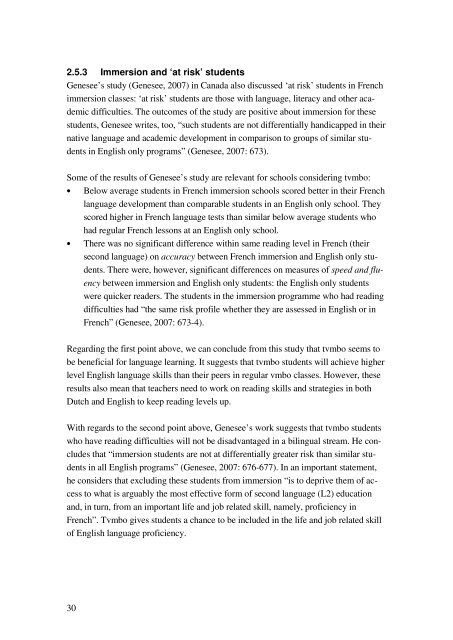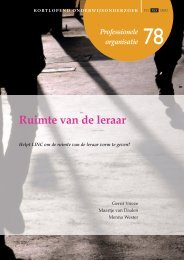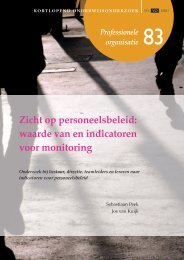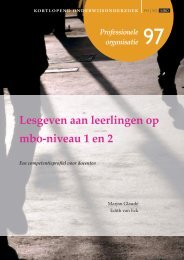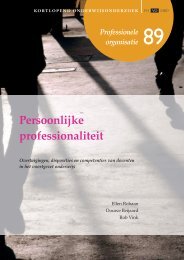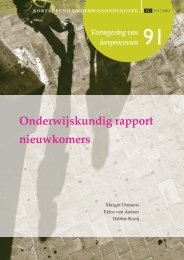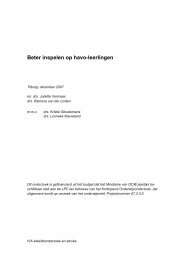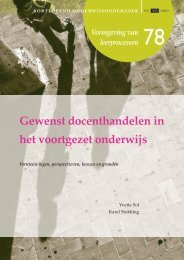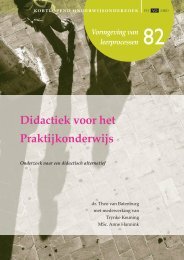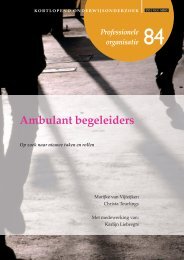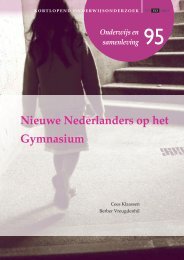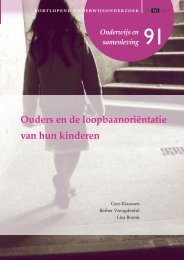Proud to be tvmbo - Kortlopend Onderwijsonderzoek
Proud to be tvmbo - Kortlopend Onderwijsonderzoek
Proud to be tvmbo - Kortlopend Onderwijsonderzoek
You also want an ePaper? Increase the reach of your titles
YUMPU automatically turns print PDFs into web optimized ePapers that Google loves.
2.5.3 Immersion and ‘at risk’ students<br />
Genesee’s study (Genesee, 2007) in Canada also discussed ‘at risk’ students in French<br />
immersion classes: ‘at risk’ students are those with language, literacy and other academic<br />
difficulties. The outcomes of the study are positive about immersion for these<br />
students, Genesee writes, <strong>to</strong>o, “such students are not differentially handicapped in their<br />
native language and academic development in comparison <strong>to</strong> groups of similar students<br />
in English only programs” (Genesee, 2007: 673).<br />
Some of the results of Genesee’s study are relevant for schools considering <strong>tvmbo</strong>:<br />
• Below average students in French immersion schools scored <strong>be</strong>tter in their French<br />
language development than comparable students in an English only school. They<br />
scored higher in French language tests than similar <strong>be</strong>low average students who<br />
had regular French lessons at an English only school.<br />
• There was no significant difference within same reading level in French (their<br />
second language) on accuracy <strong>be</strong>tween French immersion and English only students.<br />
There were, however, significant differences on measures of speed and fluency<br />
<strong>be</strong>tween immersion and English only students: the English only students<br />
were quicker readers. The students in the immersion programme who had reading<br />
difficulties had “the same risk profile whether they are assessed in English or in<br />
French” (Genesee, 2007: 673-4).<br />
Regarding the first point above, we can conclude from this study that <strong>tvmbo</strong> seems <strong>to</strong><br />
<strong>be</strong> <strong>be</strong>neficial for language learning. It suggests that <strong>tvmbo</strong> students will achieve higher<br />
level English language skills than their peers in regular vmbo classes. However, these<br />
results also mean that teachers need <strong>to</strong> work on reading skills and strategies in both<br />
Dutch and English <strong>to</strong> keep reading levels up.<br />
With regards <strong>to</strong> the second point above, Genesee’s work suggests that <strong>tvmbo</strong> students<br />
who have reading difficulties will not <strong>be</strong> disadvantaged in a bilingual stream. He concludes<br />
that “immersion students are not at differentially greater risk than similar students<br />
in all English programs” (Genesee, 2007: 676-677). In an important statement,<br />
he considers that excluding these students from immersion “is <strong>to</strong> deprive them of access<br />
<strong>to</strong> what is arguably the most effective form of second language (L2) education<br />
and, in turn, from an important life and job related skill, namely, proficiency in<br />
French”. Tvmbo gives students a chance <strong>to</strong> <strong>be</strong> included in the life and job related skill<br />
of English language proficiency.<br />
30


